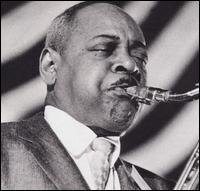Coleman Hawkins Can Play The Saxophone


Recently, I’ve been getting deeper into the works of
Coleman Hawkins. Sometimes, when he’s playing on
my stereo, I feel that I could listen to this or that solo
a million times and still not hear enough of it. His tone
and his phrasing and, for lack of a better term, his soul
shine through in virtually everything he plays. I have
recordings of him playing with perhaps the schmaltziest
string sections ever to stink up a studio and, once the
Hawk starts blowing, they’re beautiful anyway. You
could take a tape of a thousand sumo wrestlers farting
and, if Coleman Hawkins was playing in front of it, it
would be transcendent. When I die, you can bury me
in a casket with Coleman Hawkins piped in and I’d never
notice that there was no other heaven.
I think a good deal of his greatness came from his ability
to maintain a recognizable creative identity that never
became stale or stuck in the past. His stuff from the end
of his career is obviously rooted in the work he did thirty
years before, but he was never a nostalgia act. He kept
up with the innovations of younger players and incor-
porated them subtly into his own art. Hawkins was hip
to Thelonious Monk when even those far into the jazz
scene tended to dismiss him as a crazy man and the two
of them made some grand music together. Later on,
Hawkins played a ballad session with a rhythm section
that included bassist Ron Carter, eventually to join Miles
Davis’ most groundbreaking group, and drummer
Andrew Cyrille, who would become best known for his
amazing work with the intimidatingly avant-garde
pianist Cecil Taylor. Hawkins, arguably the man most
responsible for the tenor sax’s pre-eminent position in
jazz, cast a long shadow. He was never mercurial, though,
he found his tone early and it was vast enough to encom-
pass everything from the end of Dixieland to the beginning
of the free scene. Instead of changing with the times, he
drove himself to wring every last bit of magic and beauty
from his own genius. He listened to others, true, but it
couldn’t sway him from his course. There’s a whole history
in his horn, and a lifetime could easily be spent just scratch-
ing the surface of it.
I like all sorts of music, but it’s mostly jazz that’s speaking
to me these days. That’s sort of a problem when you aren’t
even thirty yet. A lot of people my age are scared off or
bored by jazz. This I blame mainly on jazz critics and snobs,
who used to be and sometimes still are so eager to have
something special for themselves that they make it seem
like you need an advanced degree to understand Miles
Davis or Ornette Coleman or anyone else. Art doesn’t
need a translator. Jazz, like any great music, can be
enjoyed by anyone who wants to. It isn’t academic or
stodgy or pompous. It doesn’t need any decoding. Some-
one who’s only listened to punk rock their entire life can
put on a Duke Ellington or Charles Mingus song and get
just as much out of it as any scholar. Sure, there’s history
and theory behind it, but the only ones who need those to
draw meaning from something are the ones who want to
get paid to write about it. Everything you need to know
about Coleman Hawkins or Charlie Parker or John Coltrane
your ears can tell you. There might be more to them, per-
haps an interesting personal story or some significance in
the overall development of the genre, but this is gravy
when there’s so much beauty just in the sound coming
from your stereo.

